- Home
- Rudy Rucker
Nested Scrolls Page 5
Nested Scrolls Read online
Page 5
He had a burr haircut, slightly waxed in front to produce a tiny, cocky pompadour. When he wanted something from a grown-up he’d put on a sweet voice and act like an angel.
Meanwhile my father was getting more involved with the St. Francis in the Fields Episcopal Church, and he taught Sunday school class there. One Sunday afternoon Pop started talking about a bright, lively boy in his Sunday school class, almost sounding like he wished I were more like this personable wonder-kid. As the conversation continued, I realized—with despair and disgust—that the old man was talking about my nemesis. Yes, Peter Bunce had been kissing up to my Dad at Sunday school. Maybe he didn’t have a father of his own, and he wanted mine?
I tried to tell Pop what a horrible person he was dealing with.
“He’s a good kid,” said my father, not understanding. “I’m sure you could be friends with him.”
The next day at school, Monday morning, Peter Bunce slugged me in the stomach. I found my big brother in the halls and explained the situation.
“I know that kid,” said Embry, narrowing his eyes. “I’ll talk to him.”
After lunch, Peter Bunce returned from recess with a bloody fat lip. He never bothered me again. I thanked Embry, but he thought the matter was hardly worth discussing. It was dog-eat-dog at Country Day.
Like a convict in a prison, I settled into life at Country Day, making friends among the lower echelons. Often the bullies and the older boys would leave us alone, and we could just be silly kids—chanting nonce words, making toys from folded paper, playing tag—small fry in the pond.
I have a clear memory of one winter afternoon, chilly and with dusk almost falling. I was waiting at the front entrance of Country Day for my mother to pick me up. The entrance porch was a simple slab of shiny concrete with brown-painted steel poles holding up a flat roof. We boys liked to dance from one pole to the next, swinging around them, hooting to each other, kicking our satchels across the pavement like shuffleboard pucks.
A few yellow leaves stuck to the damp pavement. Supper was cooking at home and the lights were going on. The sky felt cozy and low.
I realized that I was happy, and I had the strange knowledge that in later years I’d remember this particular moment.
Another good time was a birthday party for a boy whom we called Haystack Lampton—after his messy shock of uncut reddish-blonde hair. Haystack lived in a two-story brick farmhouse in our neighborhood. His family owned a parrot, which perched in one of their trees, screaming the family members’ names. They had a black cook who lived in a shack on the premises, and Haystack claimed he’d crawled under the floor to peer up through the cracks at her underwear, and that she’d only laughed when she’d noticed him.
For a special birthday party entertainment, Haystack’s parents had set out a large black rubber lifeboat. Its sides were inflated like a giant inner-tube, and the bottom was smooth rubber. The idea was to get inside it and bounce off the fat edges. But then someone found a grease gun in the barn and had the idea of squirting grease onto the raft floor so that we could slide around in our party shoes.
Some of the kids hung back, perhaps not wanting to risk spoiling their clothes, perhaps realizing we were doing something wrong. But I was fully into it. I grabbed hold of the grease gun and squeezed the stock, pushing out additional coils of shiny black lubricant. I was sliding all over the life raft, whooping. And then Haystack’s mother descended. I got all the blame.
On Christmas Eve, we’d go to church and there’d be a Christmas pageant.
In 1957, I was Joseph, and I had to spend twenty minutes in a robe staring into the Holy Cradle, which was a cardboard box with a light bulb in it. I passed the time by mentally calculating the volume of the Hi-C cans that had once filled the box, and comparing this volume to the full volume of the box.
The best part of the pageant was when some men of the church would play the Magi, walking up the aisle singing verses of “We Three Kings of Orient Are.” At first I wouldn’t be able recognize them in their robes and makeup, and then I’d realize I knew them. It was exciting and mysterious to see everyday people transformed.
Afterwards we’d go outside and the sky would be black with twinkling stars, the air crisp, and Christmas almost here.
On Christmas mornings, Mom would arrange a fan of books around the base of the tree for Embry and me. Some of the books were science fiction. Embry plowed through any and all the books—he was an omnivorous, inexhaustible reader. But it was I who cherished and pondered the SF.
I recall being absorbed by Lee Sutton’s Venus Boy with its deadly humming-birds, Andre Norton’s Star Man’s Son with its radiation-tainted ruins and telepathic Beast Things, Robert Heinlein’s worldly and colloquial time-travel extravaganza, Door Into Summer, and by his countercultural Revolt in 2100, complete with sexual innuendo and paranormal powers. I felt quite sure that someday I’d master telekinesis.
Mom regularly took me to the downtown Louisville Free Public Library, and I’d pore over their slim SF holdings—which filled but a single shelf. I remember marveling over the riches to be found in a book like The Best Science Fiction of 1949.
I recall one story that was written backwards, that is, it had a section called “The End,” followed by “The Middle,” and “The Beginning.” When I read “The End,” it seemed like a standard happy ending, but by the time I got through “The Beginning,” I realized that things had really gone wrong in “The Middle.” None of the stories in our school English anthologies were ever this wild and experimental.
The inner walls of the toilet stalls in the library men’s room were covered with sexual graffiti, seemingly by a single author who wanted to be the “sex slave” of a young man. It was hard for me to understand the writings, as they were filled with unfamiliar slang words. Naive as I was, I wasn’t quite sure if they’d been written by a man or by a woman. I was intrigued by the graffiti, and excited. It was like discovering a wall of hieroglyphs in an Egyptian tomb.
The little that I knew about sex, I’d learned from boys like Vale at school, and from a book that the children’s librarian had given my mother to give me—the book was mostly about flowers and mice. I wasn’t at all clear on what a woman’s crotch looked like. Upstairs in the children’s room at the library stood a stone statue of a goddess, and I’d actually crawled under the statue to try and see up her skirt—much to my brother’s embarrassed amusement.
By 1957, the developers were building tract homes on the old Russell farm behind us. They drained a pond, and Embry found two giant snapping turtles in the exposed mud, big fellows a couple of feet across. He and the Keith kids brought the turtles to our house. Embry wanted to keep them as pets, or perhaps to sell them.
We had some ditches in the corner of the yard where Embry, the Keiths, the Stone brothers and I had done some excavating, initially digging for buried treasure, and then planning to build a fort with a system of tunnels. Embry’s first plan for the turtles was to fill our ditches with water, and to let the giant turtles live there. But the water sank into the dirt, and Mom didn’t want him to run the hose all day long.
So Embry found a couple of battered old metal garbage cans and filled those with water, throwing in some mud so it would look like pond water. He tried sticking the turtles in there. One of them was willing to tolerate this, but not the other.
Embry set the rebellious turtle into one of the damp trenches. It looked like it wanted to crawl off, so he used his beloved electric drill to make a hole in the edge of the turtle’s shell, and he chained the shell to a corky little stink-tree.
In the morning, the chain was bitten in half, and both the turtles were gone. We never saw them again. I hoped they’d found their way overland to some watery new home, perhaps to one of the streams that coursed through the Keiths’ pastures.
As Embry was five years older than me, we didn’t play together all that much, but we’d definitely bounce off each other a few times a day.
He was agile and fl
exible, and he was able to administer powerful pinches with his feet, that is, he could use a big toe and the toe next to it like the pincers of a crab claw. Often, after dinner, he’d loll on the living-room floor near the hallway door that led to our bedrooms. And when I’d try to make my way past him to do my homework, he’d wallow across the floor and grab my ankle or my wrist with his toes. I’d scream for Mom. It was fun.
Embry himself didn’t like doing homework. He was smart, but he never developed the nose-to-the-grindstone kind of attitude that schools want to drum in. He had a Zippo lighter that he was proud of, and in the evenings, when he was supposed to be studying his Latin book, he’d squirt lighter fluid onto the glossy pages, fire it up, and tend the little flames so that the fluid would burn away without seriously charring the page.
He preferred thinking about get-rich-quick schemes, and every now and then he’d enlist me as his helper for one of his projects.
For instance, in 1957, I became the head rancher of Embry’s white mouse farm. He’d bought a pair of them from a kid at school, and his plan was that we’d breed them, sell baby mice to other kids, and make a fortune.
Mom helped me get supplies for the mice. They lived in cages in my bedroom with pine shavings in the bottom. I liked them; I named two of them Moose and Meese. They couldn’t run all that fast, so it was fun to set then down on the floor and watch them mosey around, perhaps guided by maze-walls of building-blocks. You had to be careful about sticking your finger into a mouse’s face, as he’d mistake it for a carrot and bite you, drawing blood.
The school craze for white mice faded, and we couldn’t sell any more of them, or even give them away. Embry totally lost interest. I set a few of the mice loose outside or in the houses under construction behind us, but I didn’t like to do this, as I had the feeling the mice wouldn’t survive on their own. Sometimes I’d go back to an empty house where I’d left a mouse, bringing along some food and water just in case, and I’d find the creature pathetically roaming around the endless blank wood floors, its bottom a little gray from sweeping up dust. And meanwhile the litters kept on coming. It was an impossible situation.
Finally Mom sold all our mice back to the pet store. We used our small profit towards getting started with tropical fish instead—guppies, neon tetras, zebra fish, and swordfish. The aquarium lived in my room. I liked the quiet buzz and bubble of the aerator, and the weightless way the fish would hang.
Another of Embry’s businesses was selling cinnamon toothpicks—you could buy oil of cinnamon at a drugstore, soak toothpicks in it, and sell six of them for a nickel at school, wrapped up in a tinfoil pack. They were hot and delicious, especially if you used the higher-quality round toothpicks instead of the cheap flat ones. But then our school banned cinnamon toothpicks.
On Derby Day, I’d help Embry to sell people bunches of mint to use in their julep drinks. We’d trudge door to door among subdivision houses. Some of the people who answered the door were drunk, according to Embry, although I couldn’t tell.
Embry knew about such things. He said that once he and Mom had been in an elevator, and a really drunk man had gotten in and had repeatedly muttered “Blackmail.” I liked that story a lot. I hoped that someday I’d see some really drunk people, or even get drunk myself. I was also curious about the “dope pushers” that the papers were always talking about. Where could I meet them?
The most disastrous of Embry’s businesses was when he answered an ad in Popular Mechanics that committed us to selling five dozen packs of greeting-cards. The cards were ugly and overpriced. We trudged around the neighborhood houses for a few hours selling but a single pack—to a lonely woman had us in for lemonade and cookies. Finally Pop had to phone up the greeting-card sales company to get us off the hook.
What did Embry and I need money for? One of our main outlays was for items from the fabulous Johnson Smith Catalog of novelties and gags—the same items that we’d see for sale on crowded pages in comic books, goodies such as: college-style pennants with the names of prisons on them, the wind-up joy-buzzer, itching powder, stink bombs, a trick guillotine that would cut a carrot but not your finger, Whoopee fart-noise cushions that we loved to sneak under Pop, soap that made your hands turn black, X-ray glasses that let you see people’s skeletons, silk rollers that turned one-dollar bills into tens, a handkerchief that changed from red to green, rings shaped like skulls with red glass eyes, bull-whips, switchblades, hot-air balloons, ventriloquism mouth-chirpers, the secrets of the pyramids, and a beanie attached to a pea-shooter that curved down to my mouth—or would have, except that, in my excitement, I tore the beanie in half while ripping open the package it came in.
Gambler that he was, Embry once ordered a Johnson Smith Mystery Bag which was guaranteed to contain $10 worth of merchandise for only $1. His Mystery Bag contained a comb, a pencil, an extra-thick rubber band, and a pamphlet describing how to paint your house.
He also ordered a complete set of gambling supplies, including a small roulette wheel, loaded dice, and a deck of marked and stripped cards. The “stripped” aspect meant that the cards were slightly tapered, so that if you pulled out a card, rotated it, and stuck it back into the deck, you could readily find it again.
Embry was generally friendly or neutral towards me, but sometimes he’d turn callous. I didn’t like it when my parents would go out and leave him to baby-sit. Once, or instance, I had a blister on my thumb, and he formed the idea that I should let him pop the blister with a pin.
“Pus is poisonous,” Embry intoned, not that the blister was actually full of pus. It was full of something more like water.
I locked myself into the bathroom so he couldn’t get at me. I was planning to stay in there until my parents returned. But then something slid under the door. A firecracker! I heard the strike of a match and the hiss of the fuse.
I freaked out, screaming in terror. In the tiled confines of the bathroom, the explosion deafened me, making my ears ring. When I calmed down I realized that in my thrashing around, I’d in fact popped the blister myself.
So as not to be punished for his misdeeds against me, Embry took to telling my parents that I lied a lot. “Rudy is always making things up,” he’d say out of the blue, paving the way for future outrages. “He imagines things.”
In 1957, as soon as Embry turned sixteen, he wanted a car, and my father managed to find him a 1930 Model A Ford in someone’s barn. Embry bought it for about $100, and spent a lot of time fixing it up. Being such an early model, the car’s inner workings weren’t all that complicated. And you could still buy parts for it at a dealer—after all, it was less than thirty years out of date. Embry used fiberglass to patch the rusty spots, painted the body red, and, to start with, constructed a roof from a sheet of particle board mounted on four dowels.
He sometimes drove me to school in the car, which I enjoyed. We’d ride high up off the ground, and people would look at us and wave. The car had an arcane control called a “magneto,” and by jiggling it, Embry could get the engine to backfire. Sometimes he’d ask me to steer, which was fun, but then he’d drive faster and faster, yelling at me, “Slow down,” as if I were controlling the speed as well. Once I lost control and veered off the road through somebody’s yard, scraping the bottom of the Model A on some of those concrete pyramids that people set along the edges of their lawns to deter cars.
Eventually this particular Model A caught fire. Some sparks escaped from the exhaust manifold and set the thing’s wooden floor alight. I worried that I myself had made the holes in the exhaust pipe by running over those concrete lawn-pyramids, but Embry didn’t seem to blame me. He acquired a second Model A, red and with a nice cloth roof. He never did stick with one car for long. By now we’re old men, and I imagine that he’s owned fifty cars with more to come.
Perhaps the most annoying thing Embry that ever did to me involved a motor-powered model plane that I built in 1957. I’d received it as a birthday present, it was called a Stuntmaster. The kit was very b
asic: tissue paper and some sheets of balsa wood with pieces you could pop out.
It took me weeks to glue all the struts together to make the wings, to glue the tissue paper over the wings, and to paint the thing. I bought a reel with lines for it, a little fuel-powered engine with a propeller, and with a special spark device for getting the engine to start.
Finally the great day arrived when I would fly my Stuntmaster. At this point Embry got interested in the project. Now that he was working on his car all the time, he was deemed the family expert on engines. Mom said I should let Embry start my plane’s engine, as he’d be better at it than me.
So fine, Embry started the little airplane engine, but then he insisted on holding the controller and being the first one to fly the Stuntmaster. The idea was that you’d turn around and around as the plane flew in a circle. The tricky bit was to tilt the reel left or right so as to make the plane fly higher or lower—there was a system of pulleys and levers on the plane to make this work.
Embry tilted the controller the wrong way, and my Stuntmaster crashed into the ground, snapping off the wing. From where I was standing, the damage didn’t look too bad, and I was already making plans to glue the wing back on. But Embry totally lost control—he burst into tears, ran over to my plane and jumped up and down on it, irreparably smashing it.
I couldn’t believe my eyes.
“Poor Embry,” said Mom.
“What about me?” I cried.
“Be nice to him, he feels terrible.”

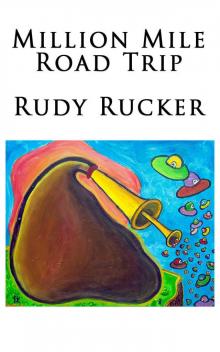 Million Mile Road Trip
Million Mile Road Trip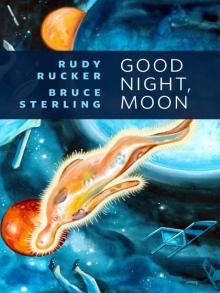 Good Night, Moon
Good Night, Moon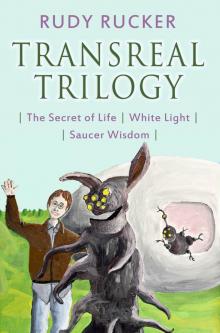 Transreal Trilogy: Secret of Life, White Light, Saucer Wisdom
Transreal Trilogy: Secret of Life, White Light, Saucer Wisdom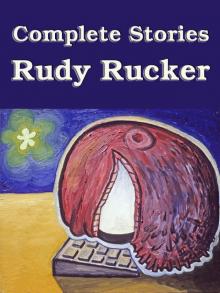 Complete Stories
Complete Stories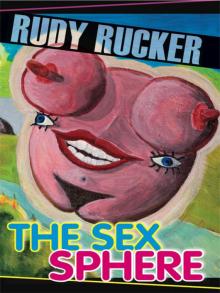 The Sex Sphere
The Sex Sphere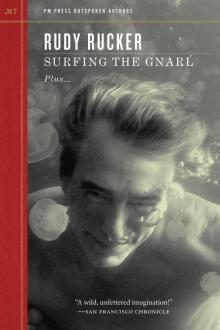 Surfing the Gnarl
Surfing the Gnarl Software
Software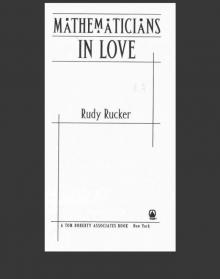 Mathematicians in Love
Mathematicians in Love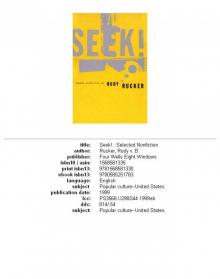 Seek!: Selected Nonfiction
Seek!: Selected Nonfiction The Secret of Life
The Secret of Life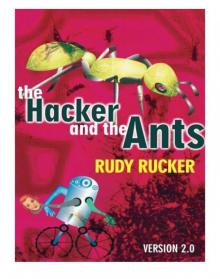 The Hacker and the Ants
The Hacker and the Ants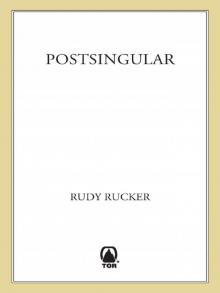 Postsingular
Postsingular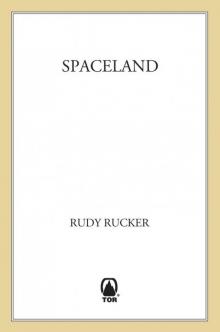 Spaceland
Spaceland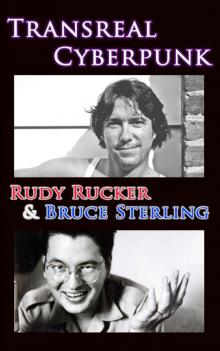 Transreal Cyberpunk
Transreal Cyberpunk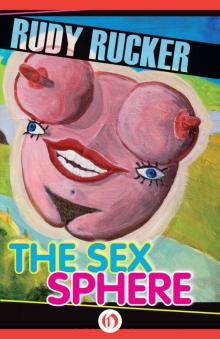 Sex Sphere
Sex Sphere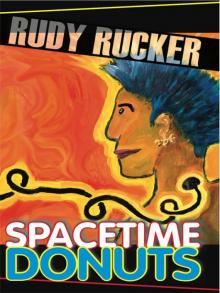 Spacetime Donuts
Spacetime Donuts Freeware
Freeware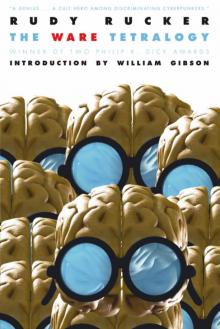 The Ware Tetralogy
The Ware Tetralogy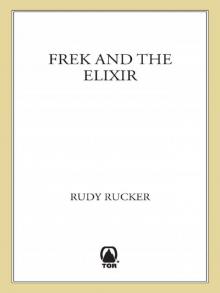 Frek and the Elixir
Frek and the Elixir Junk DNA
Junk DNA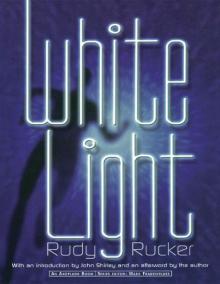 White Light (Axoplasm Books)
White Light (Axoplasm Books)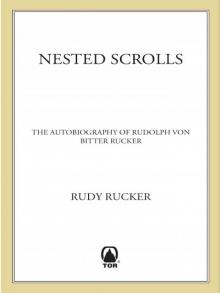 Nested Scrolls
Nested Scrolls Inside Out
Inside Out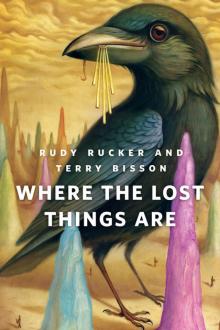 Where the Lost Things Are
Where the Lost Things Are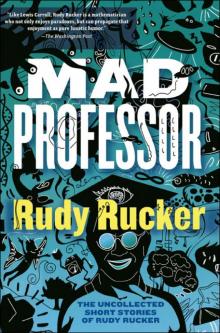 Mad Professor
Mad Professor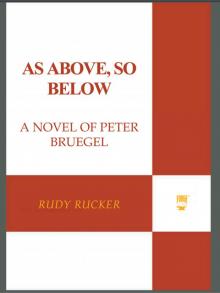 As Above, So Below
As Above, So Below Realware
Realware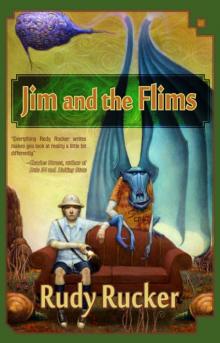 Jim and the Flims
Jim and the Flims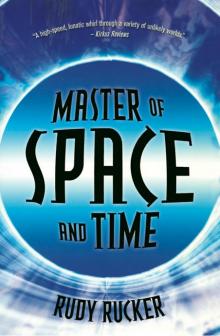 Master of Space and Time
Master of Space and Time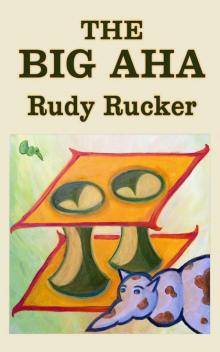 The Big Aha
The Big Aha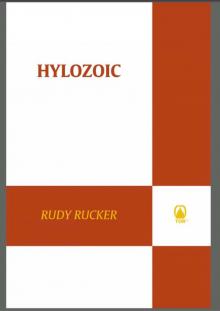 Hylozoic
Hylozoic